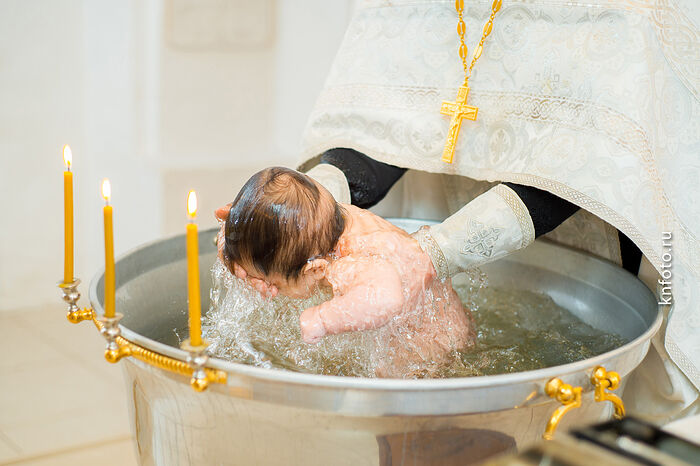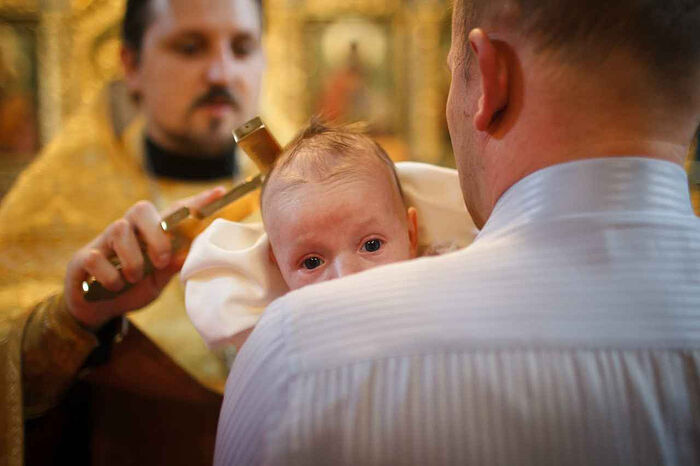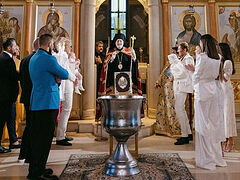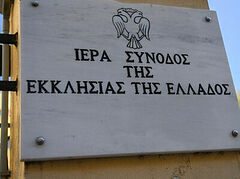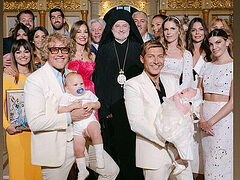The recent decision of Archbishop Elpidophoros to baptize the adopted child of an openly gay couple in Greece is only the latest addition to a series of actions which have raised Orthodox eyebrows, coming as it does hard on the heels of his decision to consecrate as bishop an archimandrite deposed by the Russian Orthodox Church Outside Russia, and his pro-abortion remark at the March for Life about women having autonomy over their own bodies. Baptizing the child was intended as a demonstration of how “progressive” the archbishop is and has indeed garnered such praise from the predictable pro-gay outlets. It is of a piece with his pro-abortion remark at the March for Life rally, and gives colour to the accusation that the Greek Church in America is simply the Protestant Episcopal Church in Byzantine dress. But here I would like to examine not the behaviour and values of the archbishop, but the more basic question of the conditions which must be met before any baby can be baptized. (Spoiler alert: these conditions were not met by the gay couple requesting the baptism in Greece.)
We begin by observing the indissoluble link between baptism and faith. The link is as old as Mark 16:15-16, which reads, “Go into all the world and preach the gospel to all creation. He who has believed and has been baptized shall be saved”. Note that believing is coupled with baptism as one of its conditions. This is why in every baptismal ritual a profession of faith is required from the candidate. That is, the candidate is asked a series of questions in a kind of liturgical grilling, and must respond in a certain way before the baptism can proceed.
Thus we read the following in the Apostolic Tradition, a document expressing the liturgical practice of Rome in the early third century. The one baptizing “shall say, ‘Do you believe in Christ Jesus, the Son of God, who was born from the Holy Spirit from the Virgin Mary, and was crucified under Pontius Pilate and died, and rose again on the third day, alive from the dead, and ascended into heaven, and sits at the right hand of the Father, and will come to judge the living and the dead?’ And when he has said, ‘I believe’, he shall be baptized again” (the second of three immersions).
The Church first questioned the candidate to ascertain whether the candidate had faith—and not just any faith, but the faith of the Church. That is why the questions were so detailed, because there were other rival groups with other faiths—groups such as the docetic Gnostics who did not believe that Christ was born from Mary or was crucified. The questions were detailed as they were for the purpose of excluding candidates who held such Gnostic views. It is clear that the early Church did not view “inclusiveness” (that modern magical word) as necessarily good or virtuous in itself.
We see this also in our present Byzantine baptismal ritual. The baptismal candidate is asked (three times, no less!) if he renounces Satan and all his works. Then after renouncing Satan three times, he is again asked three times if he has renounced Satan. This is followed by a similar series of repeated questions asking if the candidate unites himself to Christ and if he believes in Him. This confession of Christ includes the candidate’s recitation of the Nicene Creed, followed by another three-fold series of questions asking if he has now united himself to Christ.
This is rather a lot of grilling, and it is done as an expression of the absolute necessity of expressing rejection of Satan and acceptance of Christ by faith. Note the necessity of rejecting Satan as well as that of accepting Christ. We will return to this later.
Next we note that believing in Christ included a change of behaviour on the part of the candidates. In Jerusalem in the late fourth century, for example, the candidates were required to provide evidence of a changed life before the baptism could proceed. The bishop sat down in church surrounded by his presbyters. “Then one by one, the ones who are seeking baptism are brought up, men coming with their fathers, and women with their mothers. As they come in one by one, the bishop asks their neighbours questions about them: ‘Is this person leading a good life? Is he a drunkard or a boaster?’ He asks about all the serious human vices. If his inquiries show him that someone has not committed any of these misdeeds, he himself puts down his name; but if someone is guilty he is told to go away, and the bishop tells him that he is to amend his ways before he may come to the font” (from the diary of Egeria, chapter 45).
Here we see what was expressed in the baptismal questions—namely that belief in Christ necessarily entails rejection of Satan, and that rejection of Satan is expressed in a life of righteousness, in conformity with the teaching of Christ and His Church. The Church therefore requires not simply intellectual assent to certain dogmas, but commitment to a moral life as defined by its teaching. If this moral component is lacking, the baptism may not proceed; the candidate must “go away” and “amend his ways before he may come to the font”.
Next we note that these conditions are not waived in the case of infants. Instead, it is presupposed that the ones raising the infants will do so in such a way that the infant will himself come to hold to the faith and live the life that such faith requires. That is why the Church accepts the words of the sponsors as an acceptable substitute for the infant making the replies to the questions himself. To quote from the Apostolic Tradition once again: “All those who can speak for themselves shall do so. As for those who cannot speak for themselves, their parents or someone from their family shall speak for them”. Why are the parents or someone from the family stipulated as the substitute speaker?—because those are the people who will raise the child to have the required faith and righteousness.
Finally, we may connect the dots. If sincere and fervent acceptance of the Church’s faith and morality are necessary for baptism, and if those bringing infants to baptism are thereby promising to raise the child in that faith and morality, then only those with that faith and morality are allowed to bring such children to baptism. If a parent does not share the Church’s faith or if he or she rejects the Church’s morality, then that parent is not in a position to bring the child to baptism. It is as simple as that. No one is “entitled” to baptism; the candidate must meet certain conditions.
A few more remarks may be added. The oft-heard heard cry of “Suffer the little children to come unto Me” (from Mark 10:14) is utterly irrelevant to the issue at hand, not only because the children in the text were not coming to be baptized, but also because the mothers bringing them obviously had fervent faith. The words cannot be ripped from their context and used as a moral bludgeon to overthrow the consistent baptismal discipline of the Church from the beginning which made requirements of the candidates in terms of faith and conformity to its moral praxis. Unless the parents now bringing the children have the same fervency of faith and morals as the mothers bringing their children to Jesus, this text has zero relevance to the discussion.
This is not, as is sometimes said, “blaming the children for the unbelief of the parents”, but simply recognizing that the parents are not competent to bring the children for baptism. Baptizing such children would not result in the children becoming devout Christians, but apostate Christians, since the children would not be raised to be true Christians, but merely nominal ones. Sacraments are not magic, which is why faith is always required from those coming to the font. And arguably it is better to be an honest pagan than an apostate Christian, for a pagan can always repent and become a true Christian, whereas a merely nominal Christian might imagine he is a true Christian when in fact he is not.
When all is said and done, therefore, the real issue is this: What is required of someone coming to baptism? What constitutes Christian faith? The answer: Christian faith consists of renouncing all that one has in total loving obedience to Jesus (see Luke 14:33). Merely giving intellectual assent to certain propositions embodied in the Creed is not true faith, and is not sufficient to save. That is why the Church does all that liturgical grilling prior to baptism.
Confusing intellectual assent and outward respectability with true and faith and moral righteousness is disastrous, for it gives a false sense of spiritual security. State churches (such as those in England and Greece) usually baptize every baby brought to the font on the assumption that the parents have true faith. The falsity of the assumption is proven by the number of people actually attending Church every Sunday. More importantly, this false assumption is dangerous, for it encourages people to imagine that they are Christian, when in fact they are not. It is not enough for them to give an intellectual nod to Church dogmas; they need to repent and give their lives entirely to Christ. Otherwise they have the name of Christian, but not the reality of salvation. By baptizing indiscriminately, the Church unwittingly distorts and dilutes the Gospel by not insisting that the true conditions necessary for baptism be met.
The recent baptism of the adopted child of an openly homosexual couple by Archbishop Elpidophoros is a spectacular example of this distortion and dilution. It is not enough to be a Greek celebrity or a long-time friend of the archbishop. Before one can bring a child to baptism, one must repent and live according to the Gospel.

